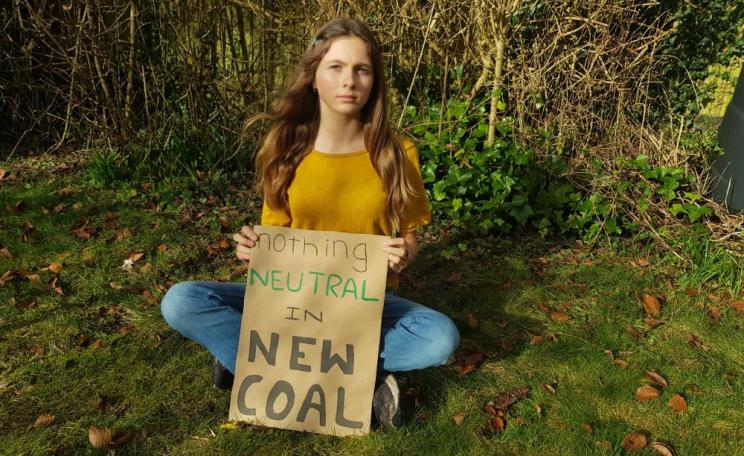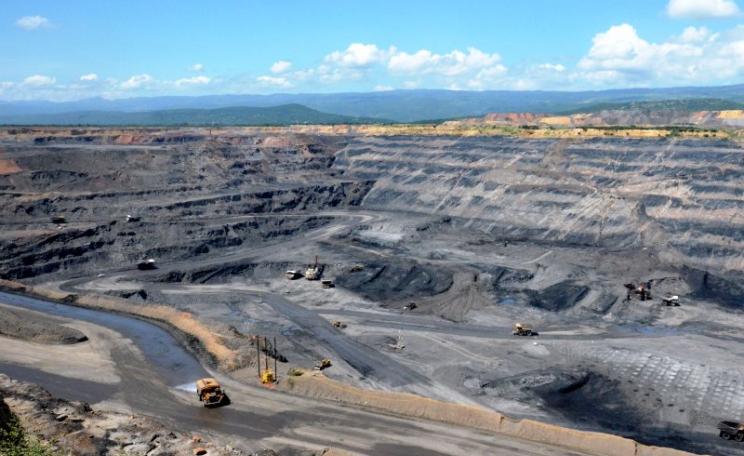Local people have shown that coal is UK heritage, but it is not our future.
Earlier this month Ferrybridge coal power station, in West Yorkshire, was demolished. Just six weeks earlier Cottam coal power station in Nottinghamshire, stopped operating. Another two coal plants, Aberthaw in South Wales and Fiddlers Ferry in Cheshire closing at the end of March 2020.
Due to power station closures and increasing renewable energy, coal contributed just 2.9 percent of electricity generated in the last twelve months. Maybe we are finally weaning ourselves off coal consumption for electricity generation - but why isn't this resulting in an end to opencast coal mining?
The environmental achievements are well worth celebrating, but sadly coal's damaging impacts are still being felt by those on the front lines of coal extraction. British opencast coal mining continues largely in southern Wales and the north east of England, and there are still applications for new mines. More must be done quickly to stop this destruction.
Coal phase-out
The UK government says it will phase-out coal by the end of 2025. This comes after years of campaigning by people across the UK to stop construction of new coal power stations, prevent opencast coal mines in our countryside and to raise awareness of the climate change and air quality issues caused by coal burning. European Union air quality rules have played a part as well.
Despite plummeting coal use, this summer there was twice as much coal in British stockpiles which the government predicts will be burnt before coal is phased-out. Undeterred, coal continues to be imported, mainly from Russia, Colombia and the USA.
Illogically, the announcement of a governmental coal phase-out intention has not had any impact on British opencast mining. Unbelievably, in 2018 two new opencast coal mines were started in England. One by Banks Group in the Pont Valley and the other operated by Hargreaves near Pittington, both in Durham.
Eleven opencasts coal mines are still operating – casting dust over nearby land and houses which causes health problems. The land is totally destroyed by this sort of mining, which unlike traditional underground methods, wipes out ecosystems as well as memories of the landscape. Local people campaign against opencasts for these reasons and the global environmental impact.
Dinosaur coal companies in the UK claim that coal will still be needed for industry. One such company is Banks Group, which is waiting on governmental decisions regarding its plans to opencast at Druridge Bay, Northumberland. Additionally, Banks is applying to extract coal at Dewley Hill near Newcastle Upon Tyne and wants to extend its Pont Valley site.
Local people have shown that coal is UK heritage, but it is not our future.
Industrial coal
Although Banks' applications to mine at all three sites originally said coal is needed for power stations, it now claims coal will go to industry instead. There has been no obvious change in demand from those consumers. When asked directly by people living near Dewley Hill, Banks Group says it will sell coal to who ever will buy it, including power stations. So Banks is really pursuing business as usual.
According to Real Trains Data compiled by Coal Action Network, coal from at least two of Banks Group's opencasts in the North East of England has recently been taken to West Burton power station. It appears that Banks is trying to downplay its role in climate change, without changing its practises.
Would the coal from new extraction sites really go to industry? Metallurgical coal, used as an ingredient in steel making, has different properties to the thermal coal which is used to produce steam in power stations and that is found at Banks' active and proposed sites.
So is this just a ploy to keep digging it up and selling it to power stations or to feed the growing exports out of the UK? Exports of coal from the UK are at an eight year high, which suggests that coal is being sold to whoever will still buy it, adding more of the world’s most polluting fossil fuel to the international market.
Cumbria County Council approved a new underground coking coal mine last summer, to supply European steelworks. There are numerous calls for the government to re-examine this decision due to a flawed process, and because the use of this coal will contribute to pushing global temperatures beyond a 1.5 degree increase, due to the energy intensity of steel production.
Government inaction
The Secretary of State for Housing, Communities and Local Government is supposed to be deciding whether Banks Group can dig up coal near Druridge Bay, as well as whether it ever should have been allowed to excavate the Pont Valley. But is the decision actively being considered?
The community at Pont Valley first called for intervention in February 2018, and a new decision regarding Druridge Bay has been pending from the Secretary of State since November 2018. Strong leadership is needed in this time of climate crisis, but action to stop opencast has been non-existent.
Local people have shown that coal is UK heritage, but it is not our future.
The government must urgently take a strong stance against all new coal mining. The remaining coal power stations must close as soon as possible. Mines sites need to be put back to what they were. Unions need to be listened to to create a meaningful transition for coal workers. The government can do this. If it chooses not to, then citizens can.
Want to do something to help? Don Kent, aka the Velvet Viking, is taking Banks Group to court for destroying the habitat of protected great crested newts in the Pont Valley. He needs your support to pay a “long-ship of lawyers” to do what the authorities failed to do and hold Banks accountable for its actions. Stay up to date with community-lead struggles to stop coal mining via the Coal Action Network newsletter.
This Author
Anne Harris is a campaigner with the Coal Action Network, she co-authored Ditch Coal (2016) which looks at the mining impacts of the UK's addiction to coal, and has been active against coal in the UK since 2008. She can be contacted on info@coalaction.org.uk







